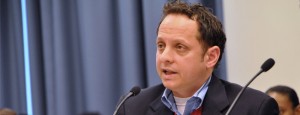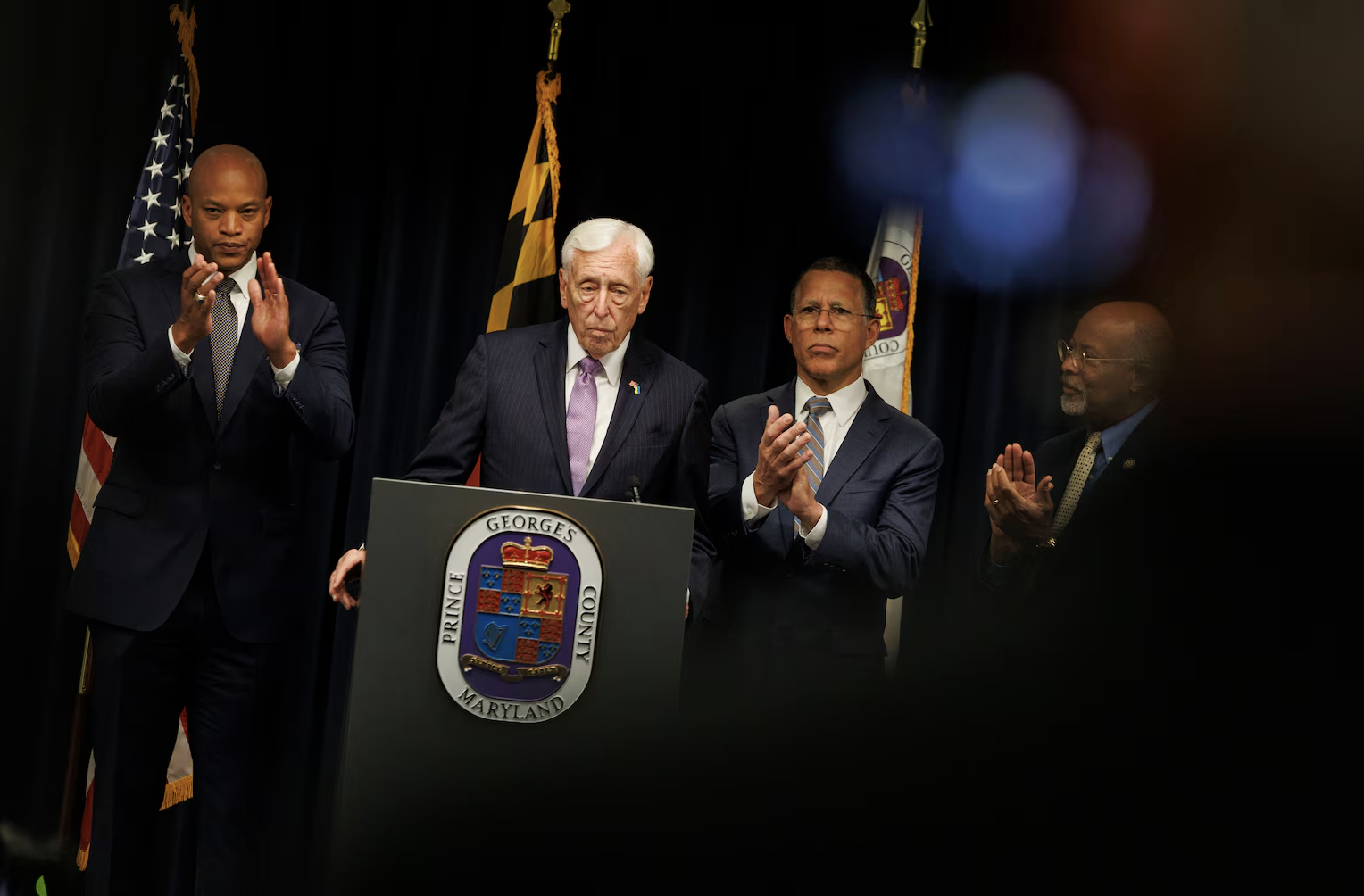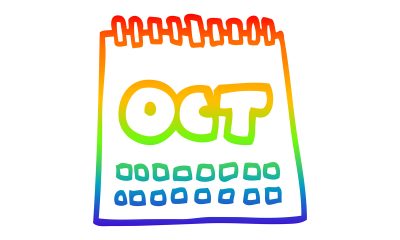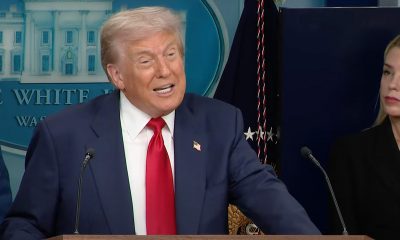Local
D.C. schools get incomplete score on LGBT youth survey
Low response rate means data not fully representative

Adam Tenner, executive director of Metro Teen AIDS, said flawed data in the biennial Youth Risk Behavior Surveillance Survey will hinder his group’s work with local youth. (DC Agenda photo by Michael Key)
A survey of risky behavior by D.C. youth, including LGBT youth, was so flawed that its data cannot be weighted, hindering local groups as they work to help gay students and fight HIV.
Leaders of two groups that provide services to LGBT youth told a D.C. City Council hearing March 5 that the Office of the State Superintendent of Education, known as OSSE, failed to ensure a required 60 percent response rate for the survey among city middle and high school students.
That failure, the group leaders said, led federal officials to declare D.C. data for the biennial Youth Risk Behavior Surveillance Survey nothing more than a snapshot of student behavior rather than an indicator of trends.
Andrew Barnett, executive director of the Sexual Minority Youth Assistance League, and Adam Tenner, executive director of Metro Teen AIDS, said the loss would adversely impact their groups’ ability to assess the needs of LGBT youth.
“This gap in data presents a tremendous loss to SMYAL and the LGBTQ youth of D.C.,” Barnett told Council Chair Vincent Gray (D-At Large), who presided over the hearing. “We rely on the [survey results] to understand the scope of problems facing youth living in D.C.”
A spokesperson for the U.S. Centers for Disease Control & Prevention, which created and funds the survey, said the CDC conducts a national version of the survey by sampling about 15,000 high school students in schools throughout the country.
Karen Hunter, the spokesperson, said the CDC also arranges for states, counties and cities to conduct their own version of the survey using a set of “core” questions established by the CDC as well as additional questions deemed important by local jurisdictions.
At the recommendation of a coalition of local community groups, including LGBT organizations, D.C. school officials agreed to add a question to the 2007 survey that gave student respondents an opportunity to disclose whether they were gay, lesbian or bisexual.
In response to a recommendation of the same coalition, OSSE agreed to add another question for the 2009 survey enabling respondents to disclose whether they are transgender. The LGBT questions are expected to be part of all future surveys.
“This was incredibly important,” said David Mariner, executive director of the D.C. LGBT Community Center.
Mariner said that identifying LGBT participants in the survey enables the community to assess the problems LGBT youth face and develop ways to address those problems.
Among the core topics included in the survey questionnaire that seek to identify “health-risk behaviors among youth” are: unintentional injuries and violence, tobacco use, alcohol and other drug use, sexual behavior, unhealthy dietary behavior and mental health issues.
Mariner and Tenner said the lack of sufficient data from D.C. students in the 2009 survey creates a four-year gap in assessing the needs of local LGBT youth because the results of the next survey, set for 2011, won’t be processed and released until 2012.
Chad Colby, an OSSE spokesperson, said that although the office is in charge of coordinating the youth survey, it is administered by the city’s public school system. Colby did not know why school officials didn’t arrange for more students to take the survey. A school spokesperson could not be immediately reached for comment.
Colby noted that the survey was “in the field” before OSSE’s new director, Kerri Briggs, was appointed to her post as the city’s State Superintendent of Education last year.
A fact sheet he released about OSSE’s views on the survey also says that the survey is not legally mandated. “Therefore, school districts are not legally required to complete the survey,” says the fact sheet.
Colby said the lack of a 60 percent return of the survey questionnaires means the data cannot be “weighted,” precluding it from being compared against data from other cities and states. He noted that the data can still be used for some purposes.
“We’re still going to be reporting it as un-weighted data,” he said. “It doesn’t mean we won’t be able to use the data to make the case for grant funding. It just means you won’t be able to compare it to other states and districts.”
But Hunter said that un-weighted data only “provides a snapshot of what’s going on among the students that were surveyed.”
She said the data cannot be used to extrapolate the behavior of the entire student population. Only “weighted data,” which is obtained from a response rate of 60 percent or greater, can be used to assess the behavior of the larger population group, she said.
Tenner said CDC officials told him the D.C. survey response rate was 36 percent for high school students and 54 percent for middle school students.
“Many of us use the Youth Risk Behavior Survey for our programs and our grants,” Tenner said in an e-mail to local activists. “From a city-wide perspective, many of us were excited to use YRBS data to objectively measure the city’s effort to improve the health of its youth and to highlight the challenges that remain.”
He called on OSSE to present a written plan on how the agency will ensure that the 2011 survey is properly implemented “with adequate student and school participation.”
Virginia
Gay Va. State Sen. Ebbin resigns for role in Spanberger administration
Veteran lawmaker will step down in February

Alexandria Democrat Adam Ebbin, who has served as an openly gay member of the Virginia Legislature since 2004, announced on Jan. 7 that he is resigning from his seat in the State Senate to take a job in the administration of Gov.-Elect Abigail Spanberger.
Since 2012, Ebbin has been a member of the Virginia Senate for the 39th District representing parts of Alexandria, Arlington, and Fairfax counties. He served in the Virginia House of Delegates representing Alexandria from 2004 to 2012, becoming the state’s first out gay lawmaker.
His announcement says he submitted his resignation from his Senate position effective Feb. 18 to join the Spanberger administration as a senior adviser at the Virginia Cannabis Control Authority.
“I’m grateful to have the benefit of Senator Ebbin’s policy expertise continuing to serve the people of Virginia, and I look forward to working with him to prioritize public safety and public health,” Spanberger said in Ebbin’s announcement statement.
She was referring to the lead role Ebbin has played in the Virginia Legislature’s approval in 2020 of legislation decriminalizing marijuana and the subsequent approval in 2021of a bill legalizing recreational use and possession of marijuana for adults 21 years of age and older. But the Virginia Legislature has yet to pass legislation facilitating the retail sale of marijuana for recreational use and limits sales to purchases at licensed medical marijuana dispensaries.
“I share Governor-elect Spanberger’s goal that adults 21 and over who choose to use cannabis, and those who use it for medical treatment, have access to a well-tested, accurately labeled product, free from contamination,” Ebbin said in his statement. “2026 is the year we will move cannabis sales off the street corner and behind the age-verified counter,” he said.
Maryland
Steny Hoyer, the longest-serving House Democrat, to retire from Congress
Md. congressman served for years in party leadership

By ASSOCIATED PRESS and LISA MASCARO | Rep. Steny Hoyer of Maryland, the longest-serving Democrat in Congress and once a rival to become House speaker, will announce Thursday he is set to retire at the end of his term.
Hoyer, who served for years in party leadership and helped steer Democrats through some of their most significant legislative victories, is set to deliver a House floor speech about his decision, according to a person familiar with the situation and granted anonymity to discuss it.
“Tune in,” Hoyer said on social media. He confirmed his retirement plans in an interview with the Washington Post.
The rest of this article can be found on the Baltimore Banner’s website.
District of Columbia
Kennedy Center renaming triggers backlash
Artists who cancel shows threatened; calls for funding boycott grow

Efforts to rename the Kennedy Center to add President Trump’s name to the D.C. arts institution continue to spark backlash.
A new petition from Qommittee , a national network of drag artists and allies led by survivors of hate crimes, calls on Kennedy Center donors to suspend funding to the center until “artistic independence is restored, and to redirect support to banned or censored artists.”
“While Trump won’t back down, the donors who contribute nearly $100 million annually to the Kennedy Center can afford to take a stand,” the petition reads. “Money talks. When donors fund censorship, they don’t just harm one institution – they tell marginalized communities their stories don’t deserve to be told.”
The petition can be found here.
Meanwhile, a decision by several prominent musicians and jazz performers to cancel their shows at the recently renamed Trump-Kennedy Center in D.C. planned for Christmas Eve and New Year’s Eve has drawn the ire of the Center’s president, Richard Grenell.
Grenell, a gay supporter of President Donald Trump who served as U.S. ambassador to Germany during Trump’s first term as president, was named Kennedy Center president last year by its board of directors that had been appointed by Trump.
Last month the board voted to change the official name of the center from the John F. Kennedy Memorial Center For The Performing Arts to the Donald J. Trump And The John F. Kennedy Memorial Center For The Performing Arts. The revised name has been installed on the outside wall of the center’s building but is not official because any name change would require congressional action.
According to a report by the New York Times, Grenell informed jazz musician Chuck Redd, who cancelled a 2025 Christmas Eve concert that he has hosted at the Kennedy Center for nearly 20 years in response to the name change, that Grenell planned to arrange for the center to file a lawsuit against him for the cancellation.
“Your decision to withdraw at the last moment — explicitly in response to the Center’s recent renaming, which honors President Trump’s extraordinary efforts to save this national treasure — is classic intolerance and very costly to a non-profit arts institution,” the Times quoted Grenell as saying in a letter to Redd.
“This is your official notice that we will seek $1 million in damages from you for this political stunt,” the Times quoted Grenell’s letter as saying.
A spokesperson for the Trump-Kennedy Center did not immediately respond to an inquiry from the Washington Blade asking if the center still planned to file that lawsuit and whether it planned to file suits against some of the other musicians who recently cancelled their performances following the name change.
In a follow-up story published on Dec. 29, the New York Times reported that a prominent jazz ensemble and a New York dance company had canceled performances scheduled to take place on New Year’s Eve at the Kennedy Center.
The Times reported the jazz ensemble called The Cookers did not give a reason for the cancellation in a statement it released, but its drummer, Billy Hart, told the Times the center’s name change “evidently” played a role in the decision to cancel the performance.
Grenell released a statement on Dec. 29 calling these and other performers who cancelled their shows “far left political activists” who he said had been booked by the Kennedy Center’s previous leadership.
“Boycotting the arts to show you support the arts is a form of derangement syndrome,” the Times quoted him as saying in his statement.
-

 District of Columbia4 days ago
District of Columbia4 days agoTwo pioneering gay journalists to speak at Thursday event
-

 Colombia4 days ago
Colombia4 days agoBlade travels to Colombia after U.S. forces seize Maduro in Venezuela
-

 a&e features4 days ago
a&e features4 days agoQueer highlights of the 2026 Critics Choice Awards: Aunt Gladys, that ‘Heated Rivalry’ shoutout and more
-

 Virginia4 days ago
Virginia4 days agoLGBTQ groups to join Spanberger inaugural parade




















